Appium with JUnit 5
Test your native and hybrid apps on a real device cloud. This guide helps you run your first test build on a real Android or iOS device on BrowserStack.

Prerequisites
-
You need to have BrowserStack Username and Access key, which you can find in your account profile. If you have not created an account yet, you can sign up for a Free Trial.
-
Environment & Build Tools:
-
For Maven: Java 8+ and JUnit 5. Ensure you have installed Maven by following the Maven installation guide and added it to your system
PATH. -
For Gradle: Java 9+. Ensure you have installed Gradle by following the Gradle installation guide and added it to your system
PATH.
-
For Maven: Java 8+ and JUnit 5. Ensure you have installed Maven by following the Maven installation guide and added it to your system
-
Required Plugin (Gradle + JUnit 5 only):
- If you are using Kotlin with Gradle, you must configure the
com.browserstack.gradle-sdkplugin in your build files to support parallel execution across multiple devices.
- If you are using Kotlin with Gradle, you must configure the
Run a sample build
Run a sample Junit 5 test build using your preferred method on BrowserStack:
Get Sample Project
Get our sample project using one of the following options:
Option 1: Download Project
After downloading the sample project, unzip it in the desired location, and open the junit-5 directory.
Configure your browserstack.yml config file
The browserstack.yml file holds all the required capabilities to run your tests on BrowserStack. It is found in your project’s (android/ios) root folder and is part of downloaded sample.
Set access credentials
Set userName and accessKey parameters in the browserstack.yml file to authenticate your tests on BrowserStack.
Select Android or iOS devices from a list of 150+ available combinations:
Use one of our sample apps to run your first Appium test on BrowserStack App Automate. Choose from the options below:
Update the browserstack.yml config file
Copy and replace the platforms object in the browserstack.yml file.
You can also pass regular expressions (regex) in deviceName and platformVersion capabilities if your device selection is more flexible. Check out how to use regular expressions to specify device attributes.
Run sample tests on BrowserStack!
Based on the devices and app selected, cd to the right project, install dependencies, and run a sample test build on BrowserStack
cd android
mvn test -P sample-test
cd ios
mvn test -P sample-test
Get Sample Project
Download Project
After downloading the sample project, unzip it in the desired location.
Import the downloaded project
Click File > Import. Expand General, select Projects from Folder or Archive, and click Next. Then, navigate to the earlier unzipped downloaded project and open the junit-5 directory.
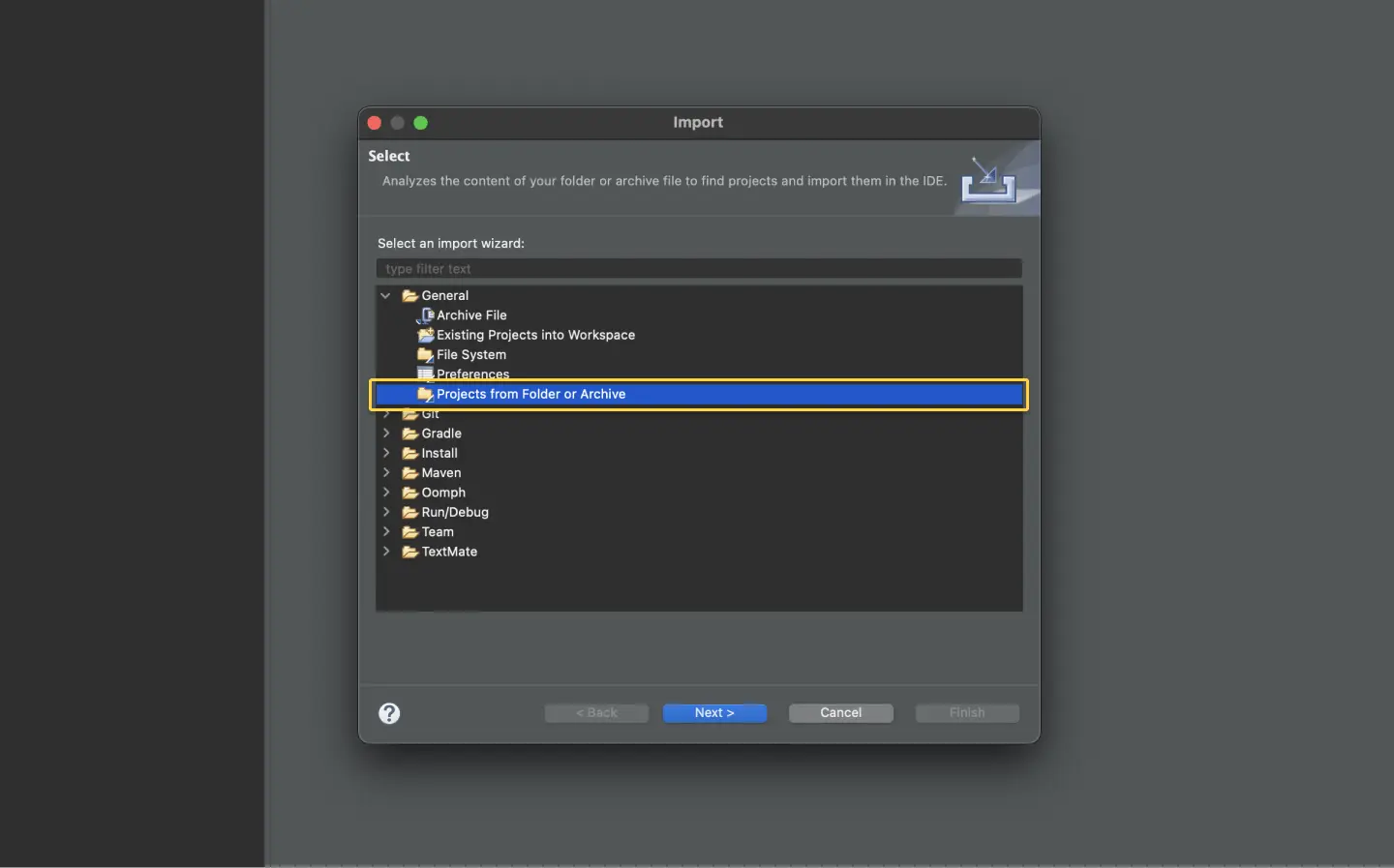
Configure your browserstack.yml config file
The browserstack.yml file holds all the required capabilities to run your tests on BrowserStack. It is found in your project’s (android/ios) root folder and is part of downloaded sample.
Set access credentials
Set userName and accessKey properties in the browserstack.yml file to authenticate your tests on BrowserStack.
Select Android or iOS devices from a list of 150+ available combinations:
Use one of our sample apps to run your first Appium test on BrowserStack App Automate. Choose from the options below:
Update the browserstack.yml config file
Copy and replace the platforms object in the browserstack.yml file.
You can also pass regular expressions (regex) in deviceName and platformVersion capabilities if your device selection is more flexible. Check out how to use regular expressions to specify device attributes.
Run sample tests on BrowserStack
On the Eclipse toolbar, click Help > Eclipse Marketplace.
In the Eclipse Marketplace, search for BrowserStack > click Install > Finish.
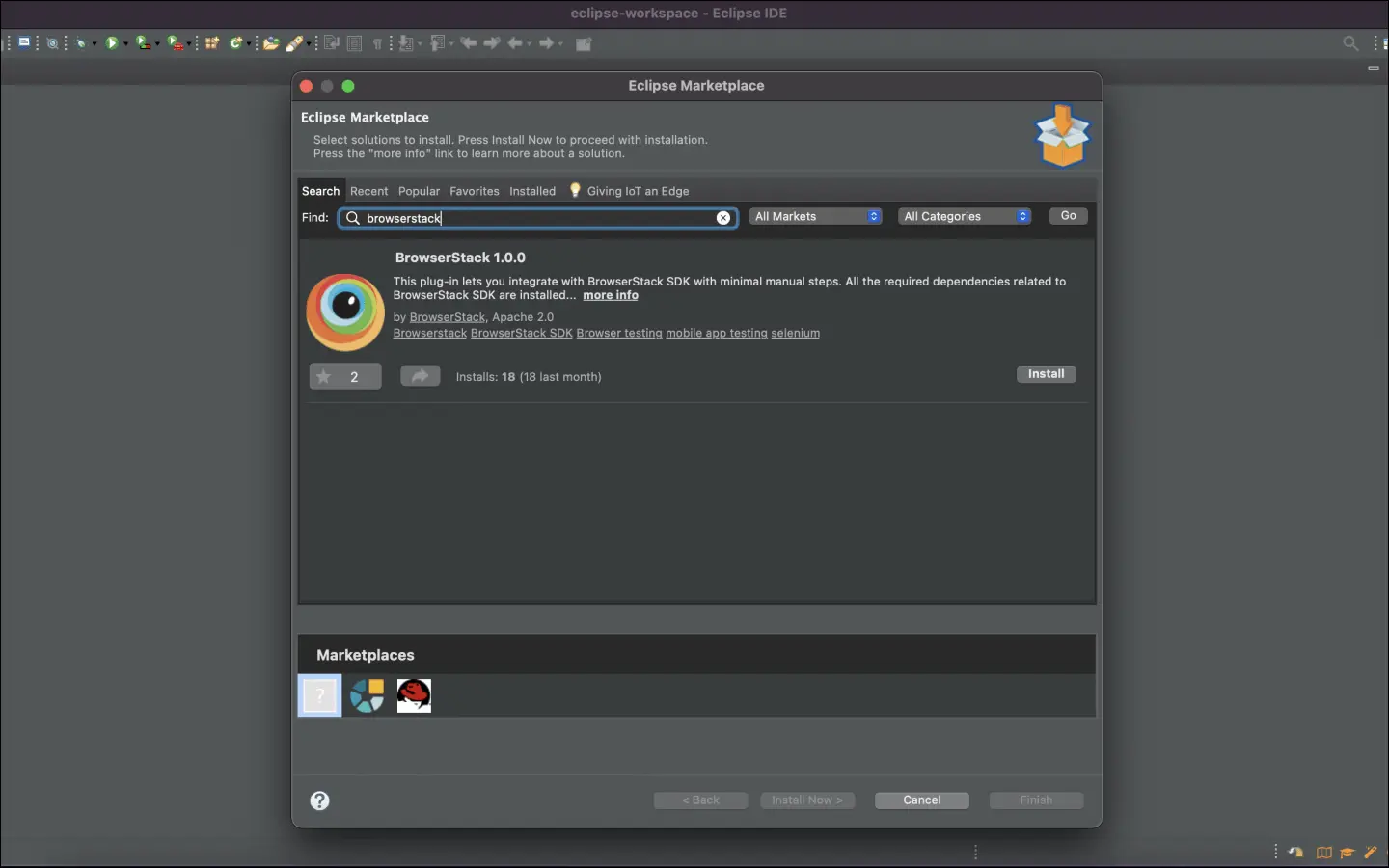
Right-click on FirstTest.java > Run As > JUnit Test
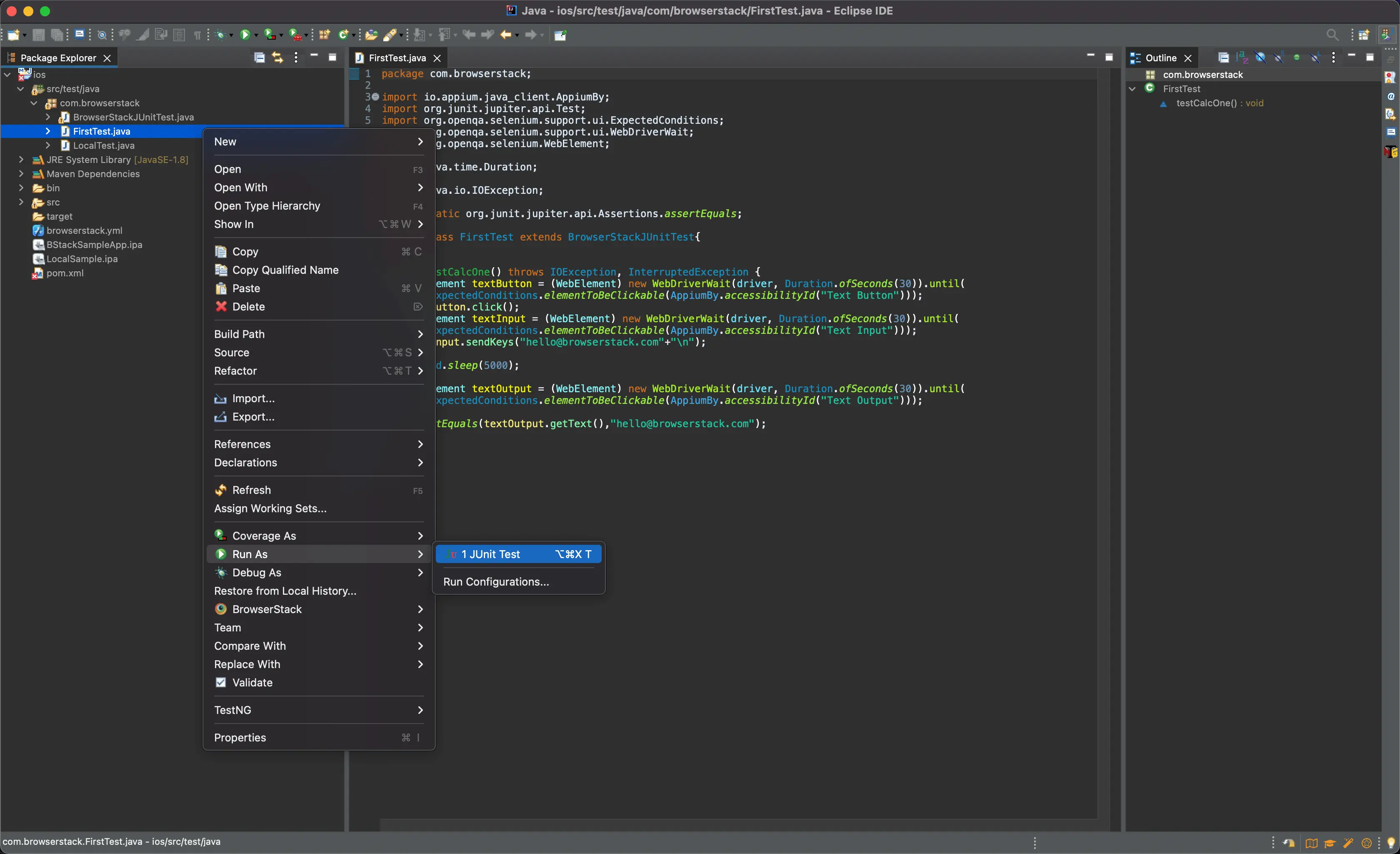
Get Sample Project
Download Project
After downloading the sample project, unzip it in the desired location.
Import the downloaded project
Click File > Open. Navigate to the earlier unzipped downloaded project and open the junit-5 directory.
Configure your browserstack.yml config file
The browserstack.yml file holds all the required capabilities to run your tests on BrowserStack. It is found in your project’s (android/ios) root folder and is part of downloaded sample.
Set access credentials
Set userName and accessKey properties in the browserstack.yml file to authenticate your tests on BrowserStack.
Select Android or iOS devices from a list of 150+ available combinations:
Use one of our sample apps to run your first Appium test on BrowserStack App Automate. Choose from the options below:
Update the browserstack.yml config file
Copy and replace the platforms object in the browserstack.yml file.
You can also pass regular expressions (regex) in deviceName and platformVersion capabilities if your device selection is more flexible. Check out how to use regular expressions to specify device attributes.
Run sample tests on BrowserStack
Click IntelliJ IDEA > Preferences > Plugins.
Search for BrowserStack and click Install.
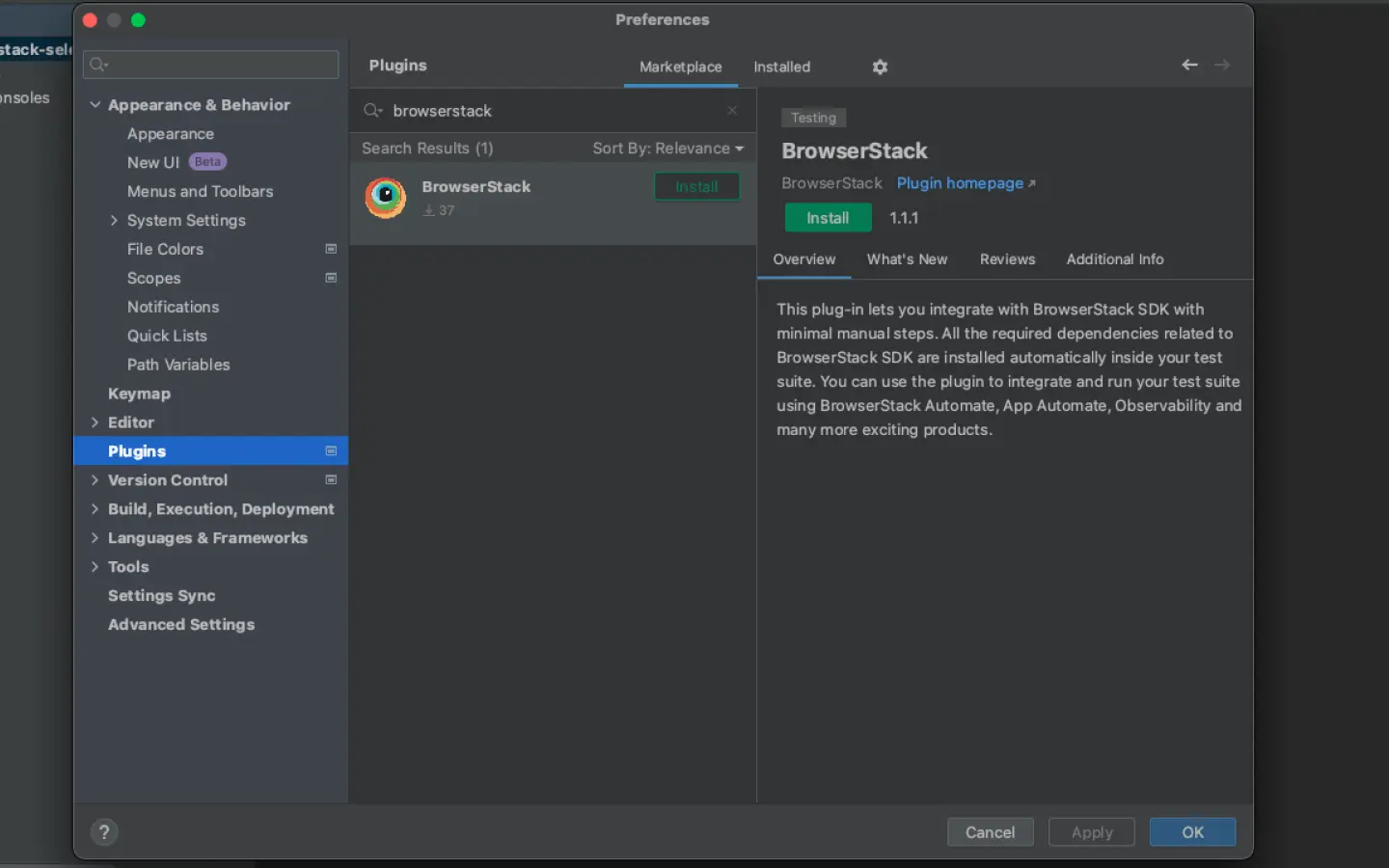
Open the file FirstTest.java and click the Run button.
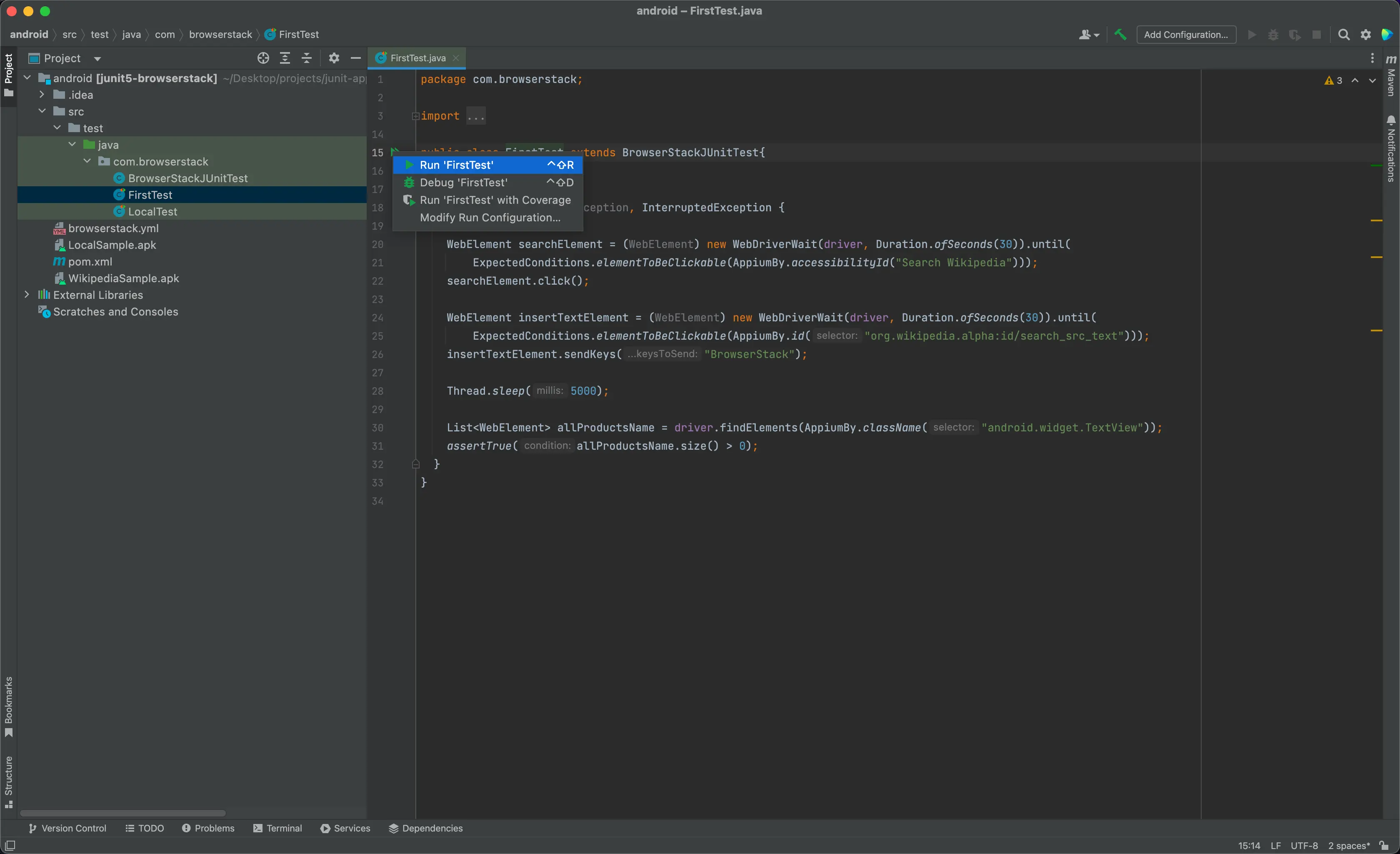
After you run your test, visit the App Automate dashboard to view your test results.
If a test run stops due to a crash, you can stop the build from running by clicking the Stop build option from the App Automate dashboard.

Next steps
After you have successfully run your first test on BrowserStack, try integrating your test suite with BrowserStack.
We're sorry to hear that. Please share your feedback so we can do better
Contact our Support team for immediate help while we work on improving our docs.
We're continuously improving our docs. We'd love to know what you liked
We're sorry to hear that. Please share your feedback so we can do better
Contact our Support team for immediate help while we work on improving our docs.
We're continuously improving our docs. We'd love to know what you liked
Thank you for your valuable feedback!
